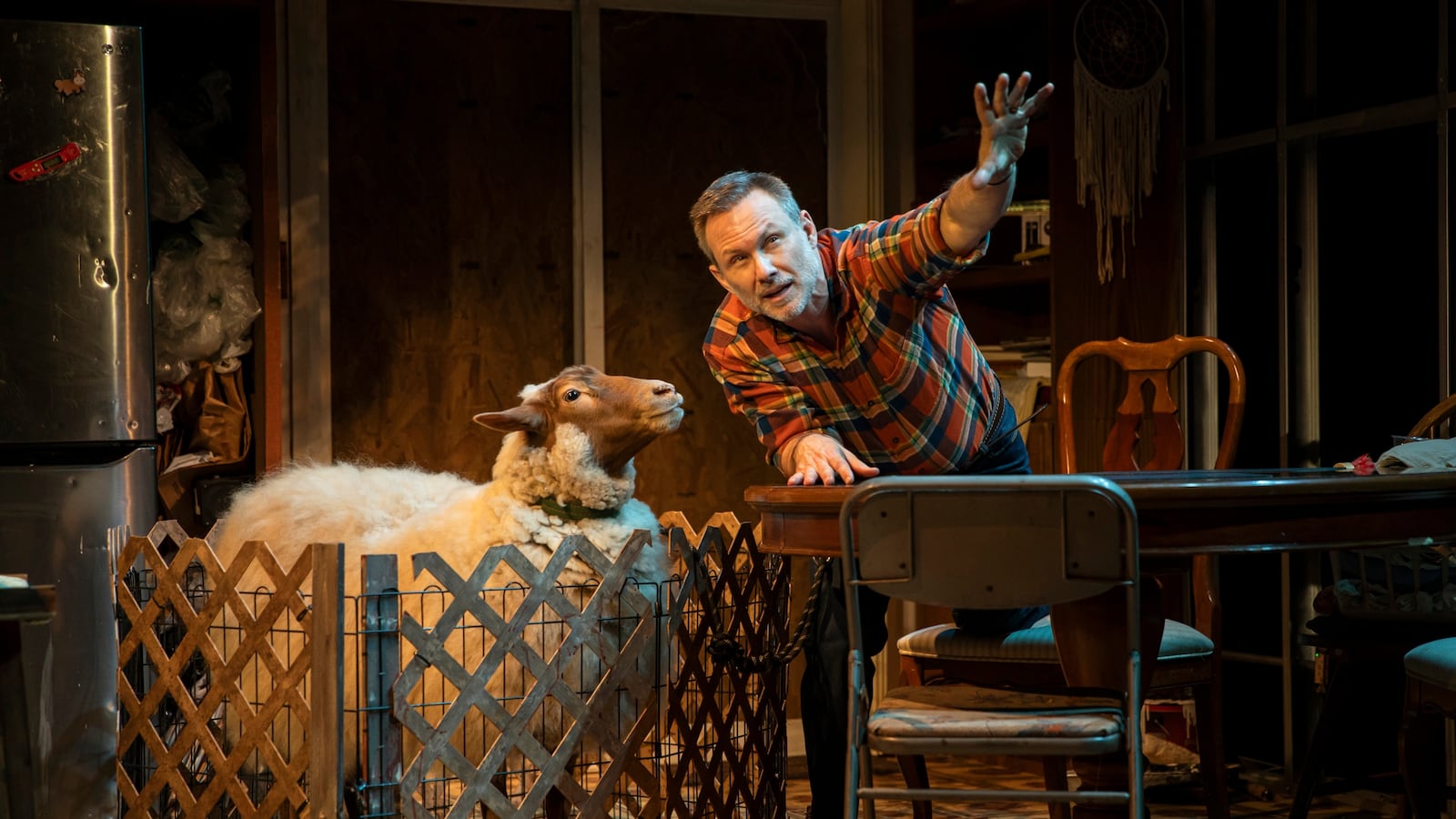Give that sheep an Obie Award.
Rarely have I felt so concerned for a live performing creature as I did watching the excellent, ferociously intense New Group revival of Sam Shepard’s 1977 family-focused drama Curse of the Starving Class (Signature Theatre, booking to April 6).
Sure, Christian Slater and Calista Flockhart provide conventional star power as Weston and Ella Tate, a combusting-in-real-time husband and wife who meaningfully do not address each other until late in the play, their home a bursting-at-the-seams trash heap around them. Their family, their kitchen, everything is in hurtling freefall, and the family’s live, on-stage sheep has maggots, rotting—like the Tates—from the inside out.

It is this creature, played by Lois, a 4-year-old Californian Red sheep trained by Vidbel Animal Actors, that has the most impeccable timing, gazing at characters when being spoken to, or simply observing them plainly—as if the most neutral of psychiatrists watching a client bare their damaged soul.
Lois’ timing with Slater is particularly, spookily good—so much so that Slater almost acknowledged his four-legged scene-stealing co-star with a wide smile, as she seemingly responded to his earnest soliloquizing. Sometimes Lois simply gazed out at us as her human owners babbled on. You don’t often coo at a Sam Shepard play, but such is the winsome power of Lois.
Curse of the Starving Class was the first of a series of Shepard plays about families in various states of disarray and meltdown: Buried Child (1978), True West (1980), Fool for Love (1983), and A Lie of the Mind (1985) would follow.
Curse—with a resoundingly strong first act, and a still-impressive if more blurrily executed second—tolls doomily directly into our present day, and the financial and other pressures bearing down on the middle and lower-middle classes, for whom financial security feels ever more vexed. The play asks big questions about need, greed, and family in a compact, fractured, familial space. Shepard and this brilliant cast find much humor, as well as abuse and bloody sacrifice, in the unfolding death-match.
The Tates, a family that would seem to be middle to lower middle class, feel as if they have nothing. Around them, forces of corrupt capitalism and avatars of the free market seek to manipulate their desperation to survive and filch even more from them. We watch a home, and its human and physical contents, get razed; propriety is no match for property. If you know the play, you know any concerns for the sheep’s welfare are well-founded.

When the lights come up on Arnulfo Maldonado’s atmospherically dated and scuffed set, the kitchen of the Tate family home is a bashed-up mess, thanks to a late-night rampage by Weston. Shepard’s drama drills into the harsh basics of what makes a home and what constitutes need.
Both Weston and Ella think they have gulled the other in separate efforts to sell this house and move on with separately planned futures. But both themselves have been tricked and manipulated (Kyle Beltran is wonderfully oily and Jeb Kreager believably thuggish as the two contrasting thieves-on-the-make).
You think when they do see each other Weston and Ella will co-explode, harm and injure, maybe even kill each other. We have seen their fury and lack of parental care raw and exposed right in front of us. But when they do come face to face, nothing is left bar scrabbling over what can be retrieved or profited from some sundry entrails—and then sleep on the kitchen table (the one activity they do share, nimbly though separately) as the rest of their world implodes around them.
Over and over again, we hear of the hunger the characters feel, both literal and in their souls; they open and bang the doors of the fridge to express their frustration. The fridge is the void, it’s where their hunger should be sated—but instead it is the family’s impassive altar of desperation. The answer, sadly, doesn’t lie in a sudden plenitude of artichokes. Props (no pun intended) to Jackson Berkley, the play’s “properties supervisor,” who must clear the wreckage of this play up after every performance.
Slater is a viscerally convincing lunatic and lacking human (Lois doesn’t even flinch when he wrecks the kitchen in one furious rampage). Even when he has calmed down, cooked breakfast and folded the laundry, it’s a transformation into dad-dependability we don’t buy.
The similarly impressive Flockhart has a flinty detachment from both reality and her family (wait for the Jackie O sunglasses that really place her off-limits). She doesn’t care about her husband’s violence, or her home and kids in peril. We watch her and Weston’s parallel maneuvers plotting domestic escape, and wonder if humans reduce themselves, or if they are blithely complicit in their own diminishing—or, whatever, will they be inevitably diminished by those determined to exploit them?
Unsurprisingly, the Tates’ children, Wesley (Cooper Hoffman) and Emma (Stella Marcus), are very much not OK. (Note how their names mirror their parents’; the sense that they too will be bequeathed or pursue parallel twin tracks to their own personal hells.) Hoffman first pisses over some chicken-related art-work his sister is making, and will later appear stark naked much to the surprise of his mother and utterly unnoticed by his father. Emma wants to leave this madness, but is pretty mad herself. The contrast between Shepard’s lyricism and his characters’ feral behavior is sharp.
Any conventional parental responsibility one might expect from Weston and Ella is absent. Their children occupy the home more naturally than they; Hoffman transmits a meekness and search for true familial connection—a search that when shown to be futile transforms his being to a folded-up, face-obscuring fury.
The family exist in individual silos, speaking at cross purposes to each other, then revealing themselves fully in other monologues to the audience. There is no obvious love, or need for it. They can’t live with each other, can’t live without each other—and so choose a kind of path of mutually assured destruction.

The intensity of Shepard’s writing—which segues dazzlingly from brutal to whimsical to extravagantly operatic—is matched in director Scott Elliott’s impressive staging in one of Signature’s smallest spaces. You feel as if you’re being held hostage by what unfolds before you in this theater; the harm and dysfunction afflicting and being dished out by the Tates is the most vicious of vicious cycles, and dangerously, physically close, accentuating our discomfort.
As for Lois, we can rest easy. It was heartening to discover via the program that during the holiday season this most Method of sheep is proud to be a featured actress in the live Nativity at Radio City Music Hall; plus, “she enjoys spending the rest of her year frolicking on 68 acres of pasture and forest in the Catskill Mountains with 6 other sheep friends and several rescued dogs, horses and goats.” It’s as close to a happy ending as you’ll find in Curse of the Starving Class.









